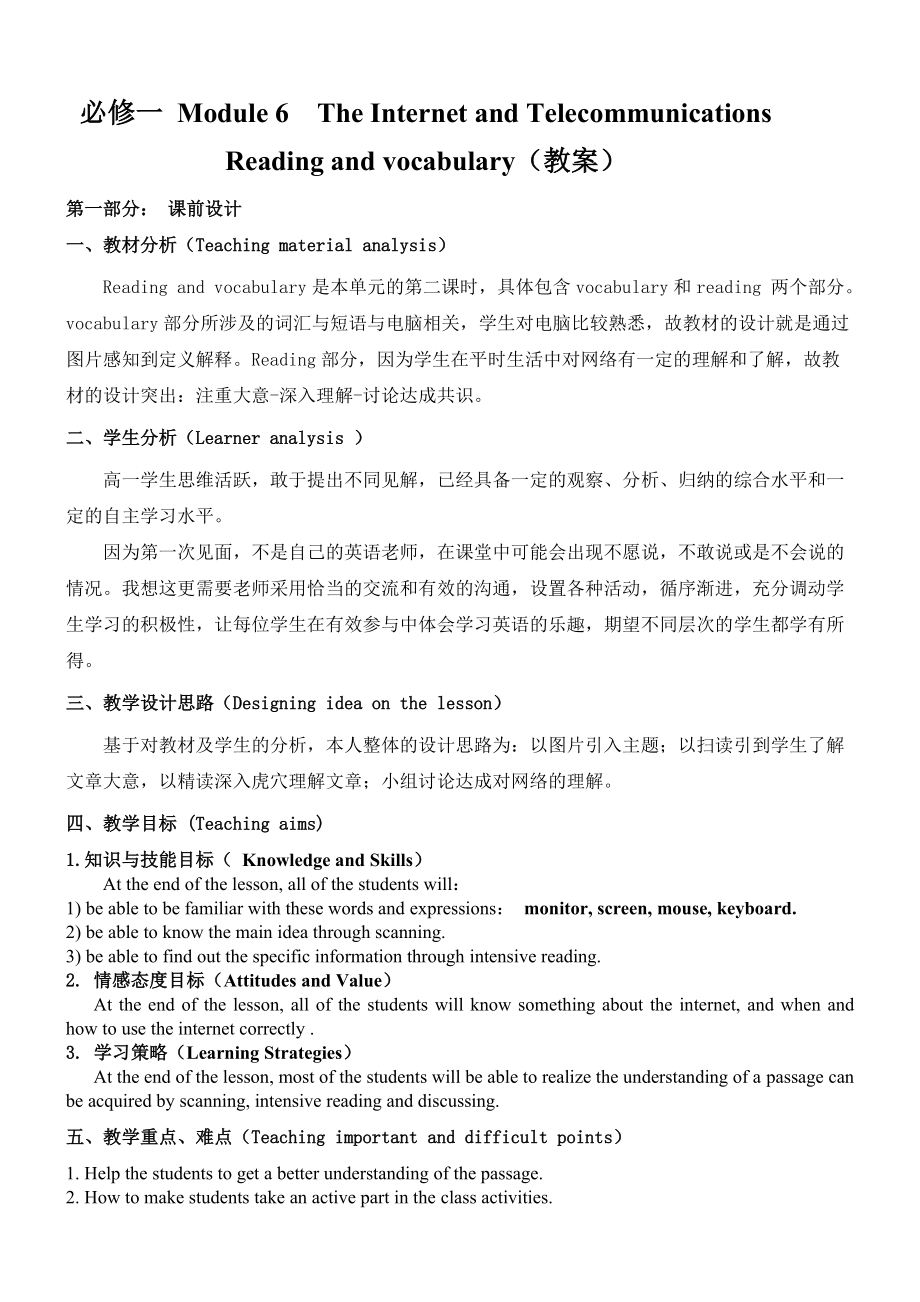《Module 6 The Internet and TelecommunicationsReading and vocabulary(教案)》由會員分享,可在線閱讀��,更多相關(guān)《Module 6 The Internet and TelecommunicationsReading and vocabulary(教案)(3頁珍藏版)》請在裝配圖網(wǎng)上搜索�。
1、
必修一 Module 6 The Internet and Telecommunications
Reading and vocabulary(教案)
第一部分: 課前設(shè)計
一�����、教材分析(Teaching material analysis)
Reading and vocabulary是本單元的第二課時����,具體包含vocabulary和reading 兩個部分���。vocabulary部分所涉及的詞匯與短語與電腦相關(guān)�,學(xué)生對電腦比較熟悉����,故教材的設(shè)計就是通過圖片感知到定義解釋。Reading部分�,因?yàn)閷W(xué)生在平時生活中對網(wǎng)絡(luò)有一定的理解和了解,故教材的設(shè)計突出:注重大意-深入理解-討論
2�、達(dá)成共識��。
二����、學(xué)生分析(Learner analysis )
高一學(xué)生思維活躍�����,敢于提出不同見解����,已經(jīng)具備一定的觀察、分析�、歸納的綜合水平和一定的自主學(xué)習(xí)水平。
因?yàn)榈谝淮我娒?,不是自己的英語老師,在課堂中可能會出現(xiàn)不愿說���,不敢說或是不會說的情況����。我想這更需要老師采用恰當(dāng)?shù)慕涣骱陀行У臏贤?��,設(shè)置各種活動����,循序漸進(jìn),充分調(diào)動學(xué)生學(xué)習(xí)的積極性�,讓每位學(xué)生在有效參與中體會學(xué)習(xí)英語的樂趣,期望不同層次的學(xué)生都學(xué)有所得�����。
三����、教學(xué)設(shè)計思路(Designing idea on the lesson)
基于對教材及學(xué)生的分析,本人整體的設(shè)計思路為:以圖片引入主題��;以掃讀引到學(xué)生了解文章大
3��、意�,以精讀深入虎穴理解文章��;小組討論達(dá)成對網(wǎng)絡(luò)的理解�����。
四�、教學(xué)目標(biāo) (Teaching aims)
1.知識與技能目標(biāo)( Knowledge and Skills)
At the end of the lesson, all of the students will:
1) be able to be familiar with these words and expressions: monitor, screen, mouse, keyboard.
2) be able to know the main idea through scanning.
3) be able to
4��、 find out the specific information through intensive reading.
2. 情感態(tài)度目標(biāo)(Attitudes and Value)
At the end of the lesson, all of the students will know something about the internet, and when and how to use the internet correctly .
3. 學(xué)習(xí)策略(Learning Strategies)
At the end of the lesson, most of the
5�、students will be able to realize the understanding of a passage can be acquired by scanning, intensive reading and discussing.
五�����、教學(xué)重點(diǎn)�、難點(diǎn)(Teaching important and difficult points)
1. Help the students to get a better understanding of the passage.
2. How to make students take an active part in the
6、 class activities.
六��、教學(xué)方式
1. Task-based teaching method
2. Leaner-centered
七�、教具 (Teaching tools)
Blackboard, multimedia, students’ papers
第二部分: 教學(xué)過程
一、教學(xué)設(shè)計步驟(Teaching Procedures)
Steps
Activities
Intentions
Greetings
Pre-task
Step 1
Introduction
Ss review these words: monitor, screen
7�、, mouse, keyboard by watching and explaining with the help of T. Then take part in the interaction and understanding of these words.
Mobilize Ss to learn with a high spirits at first. Then present these words with pictures in order to check whether Ss acquire these words or not, and arrange for the
8、 revision smoothly.
Step 2
Match
Ss review the words by matching the words with the definitions.
Check the exercises and show Ss how to give a definition to a word.
While-task
Step 3
Scanning for the main idea
Ss read the passage and find out the main idea through scanning and divide the p
9����、assage into parts.
Guide Ss to discover the main idea and divide the passage into parts.
Step 4
Task-based reading for questions
Read the passage carefully and find out the answer to the questions given. and then answer the question.
Give Ss another chance to read the passage carefully and hel
10、p Ss to find out the answers.
Step 5
Task-based reading for decisions
Read the passage carefully again through intensive reading and decide which statement is true.
Give Ss more chances to read the passage carefully and help Ss to decide true or false.
Post-task
Step 6
Conclusion
After rea
11�����、ding the text, Ss should work together and retell the text and fill in the blanks
Guide the Ss to retell the text and help them fill in the blanks.
Step 7
Discussion
Ss work in groups of four and discuss: What can you do using the Internet?
Encourages Ss to discuss: What can you do using the
12�、Internet? The purpose of discussion is to let Ss realise the advantages and disadvantages of the internet.
Step 8
Evaluation
Ss should do self-evaluation after reading the text and participating in the class..
Encourages Ss to evaluate themselves.
Assignment
1. Read the passage on Page 52 again and finish task4on page 53.
二、板書設(shè)計
Module 6 The Internet and Telecommunications
Reading and vocabulary
I. Words
II. Scanning and intensive reading
 Module 6 The Internet and TelecommunicationsReading and vocabulary(教案)
Module 6 The Internet and TelecommunicationsReading and vocabulary(教案)

